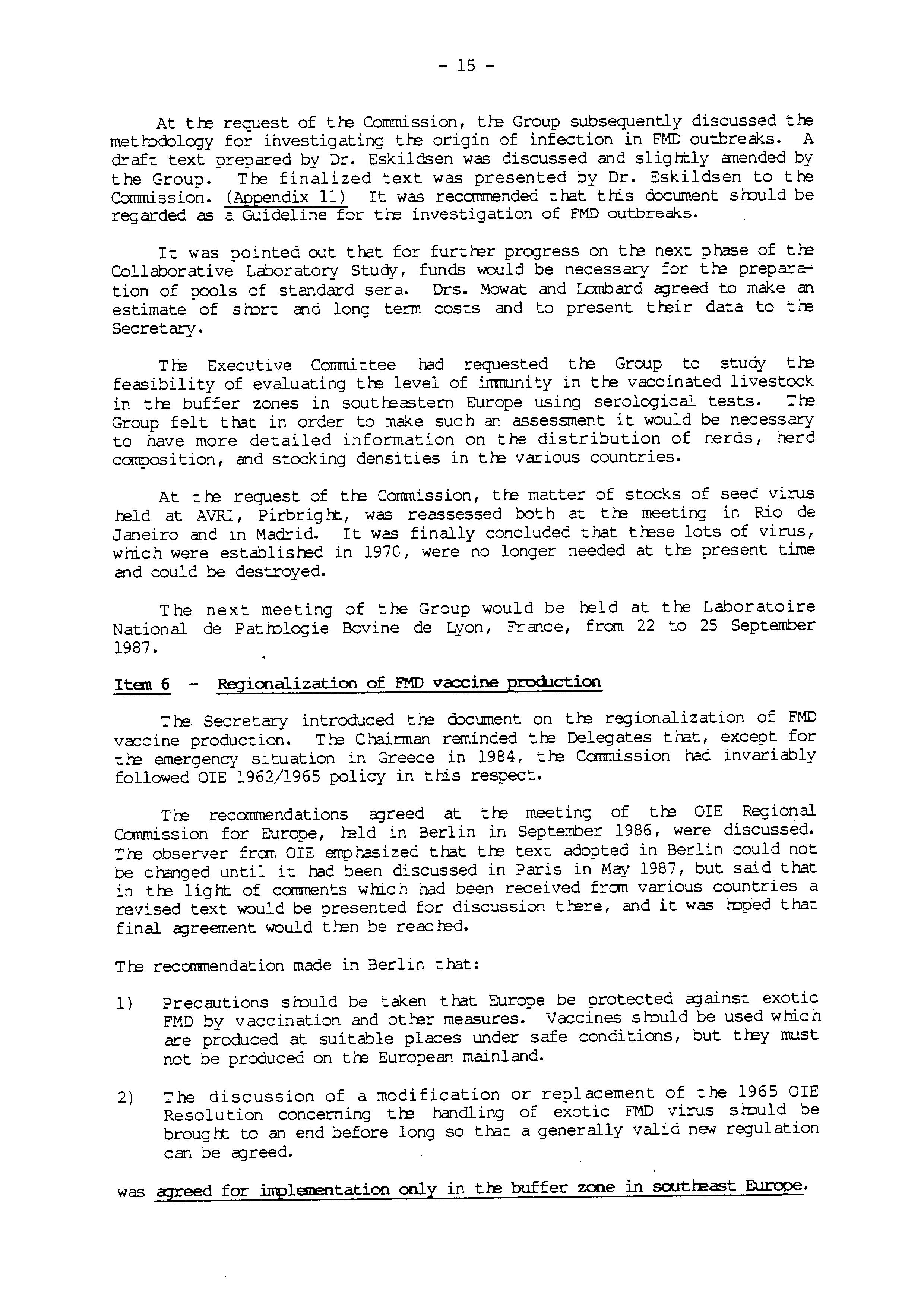
17 minute read
Appendix
At the request of the Commission, tre Group subsequently discussed the met.!Ddolc:g-y for investigating tre origin of infection in FMD outbreaks. A draft text prepared by Dr. Eskildsen was discussed and slightly anended by the Group. The finalized text was presented by Dr. Eskildsen to the Corrmission. (Appendix 11) It was recanmended that this d:::x:ument slDuld be regarded as a Guideline for tre investigation of FMD outbreaks.
It was pointed out that for further prc:g-ress on the next phase of the Collaborative Laboratory Study, funds would be necessary for the prepara-tion of pools of standard sera. Drs. Mowat and Lanbard cgreed to make an estimate of s.!Drt and long term costs and to present their data to the Secretary.
Advertisement
The Executive Corrmittee had requested the Group to study the feasibility of evaluating tre level of irrmunity in the vaccinated livestock in the buffer zones in southeastern Europe using serological tests. Tre Group felt that in order to ::nake such an assessment it would be necessary to have more detailed information on the distribution of herds, herd composition, and stocking densities in the various countries.
At the request of the Corrmission, the matter of stocks of seed virus held at AVRI, Pirbriglt., was reassessed both at tre meeting in Rio de Janeiro and in Madrid. It was finally concluded that these lots of virus, which were established in 1970, were no longer needed at the present time and could be destroyed.
The next meeting of the Group would be held at the Laboratoire National de Pat.!Dlc:g-ie Bovine de Lyon, France, frcm 22 to 25 September 1987.
Item 6 Re]ionalization of FMD va::::cine prodlction
The Secretary introduced the document on tre regionalization of FMD vaccine production. Tte Chairman reminded the Delegates that, except for tre emergency situation in Greece in 1984, tre Ca:mnission had invariably followed OIE 1962/1965 policy in this respect.
The reccmrnendations cgreed at the meeting of the OIE Regional Ca:mnission for Europe, reld in Berlin in September 1986, were discussed. :'re observer fran OIE emphasized that the text adopted in Berlin could not be changed until it had been discussed in Paris in May 1987, but said that in tre light of caranents which had been received f:--an various countries a revised text 'WOuld be presented for discussion there, and it was roped that final cgreement would tren be reac red.
Tre recorrnnendation made in Berlin that:
l) Precautions s.!Duld be taken that Europe be protected cgainst exotic FMD by vaccination and otter measures. Vaccines srould be used which are produced at suitable places under safe conditions, but trey must not be produced on tre European mainland.
2) The discussion of a modification or replacement of the 1965 OIE
Resolution concerning tre handling of exotic FMD virus srould be brought to an end before long so that a generally valid new regulation can be a;Jreed.
was agreed for implenentation only in tra buffer zone in soutreast Europe.
Item 7 International FMD vaxine bank
Tre Delegate fran UK introduced a sl'Drt paper on tre International FMD vaccine bank establisred by seven participating countries and sited outside tre security zone at AVRI, Pirbriglt.. None of tre participating countries vaccinate a:;;iainst FMD and tre bank provides a relatively creap insurance p::,licy sl'Duld any of ttem wish to do so in an emergency. Concentrated antigen is stored over liquid nitrcgen and can be reconstituted within five days if required. Tre new dia:;;inostic test used by tre FA0 World Reference Laboratory now enables tre laboratory to give advice on tre suitability of vaccine for a specific outbreak within this time limit.
In answer to questions fran tre Chairman, tre Delegate fran UK stated that tre addition of ASIA-1 to tre antigen strains already stored was still under discussion and that no final decision had yet been taken. Discussions with tre m.erican vaccine bank were also at a vecy early sta:;ie, only tecmical details raving so far been reviewed.
T re Delegate fran Denmark stated that concentrated frozen antigen had been stored at Lind.tnlm for eig It. years wit.rout loss of potency and tre PAH0 observer commented that oil adjuvant vaccine h3.d been stored at -6o0 c for five years wit.rout loss of potency. He felt that this was a potentially useful met.rod of storing reference vaccines, particularly in South American conditions.
The EEC Delegate carmented that tre FMD Oirective provides aut.tnrity to develop an EEC vaccine bank, Tre EEC intends to study tre subject and ropes to make a proposal to tre Council of Ministers by 1 January 1989.
The Chairman concluded -;re brief discussion by re-emphasizing tre potential importance of a vaccine bank for countries w hie h follow a sta:nping out policy and which do not vaccinate. Tre existence of tre Bank also h3.d relevance to p:::,licy changes which may be made as a result of tre cost-benefit study of tre vaccination policy in Europe.
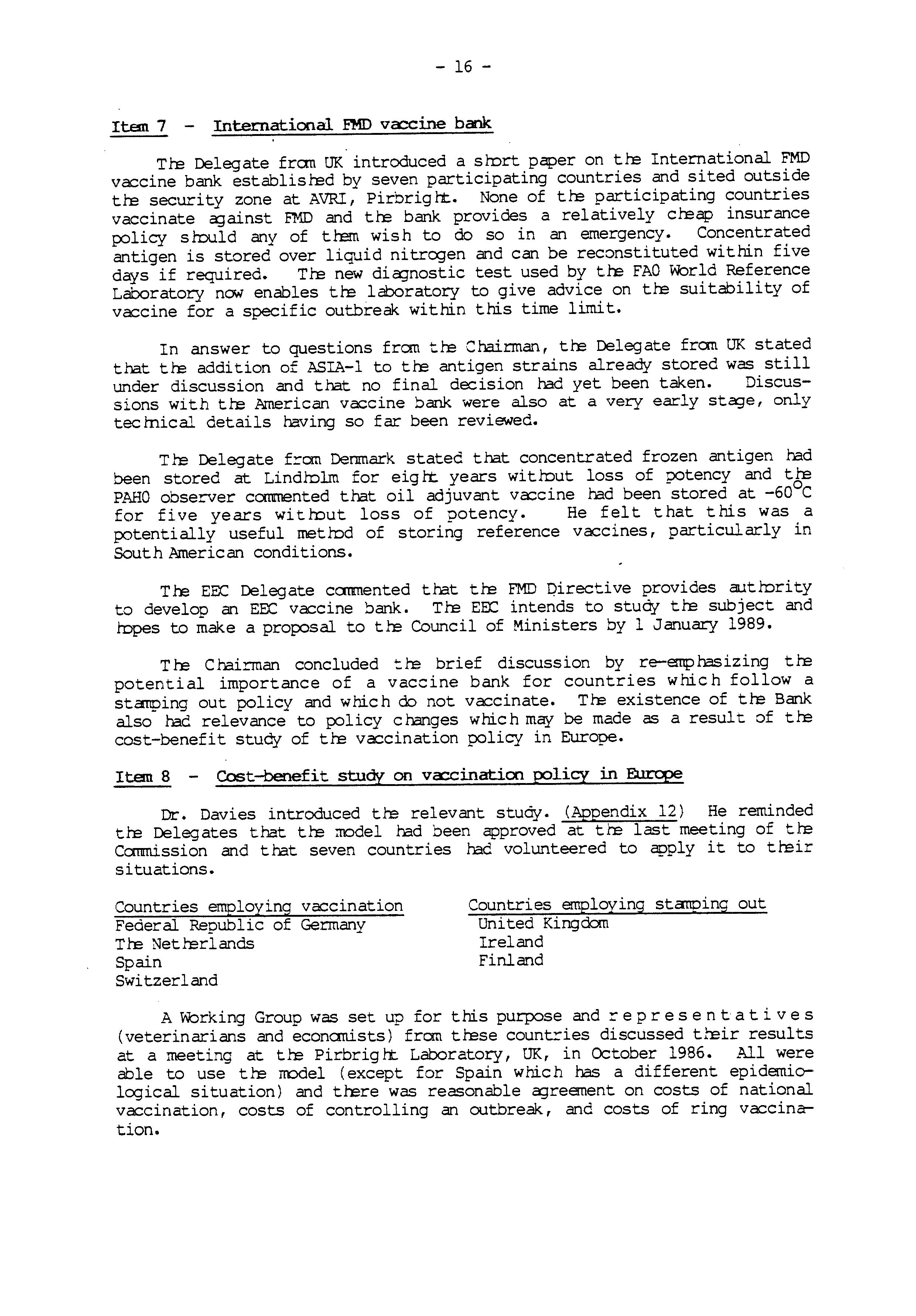
Item 8 - Cost-benefit study on vaccination policy in Europe
Dr. Davies introduced tre relevant study. (Appendix 12) He reminded tre Delegates that tre model had been approved at tre last meeting of tre Camnission and that seven countries had volunteered to apply it to treir situations.
Countries employing vaccination Feder al Republic of Germany Tre Netrerlands Spain Switzerland Countries employing stanoing out
United Kingdom
Ireland
Finland
A Working Group was set up for this purpose and representatives (veterinarians and econanists) £ran trese countries discussed ttEir results at a meeting at tre Pirbrig It Laboratory, UK, in October 1986. All were able to use tre rrodel (except for Spain which has a different epidemiological situation) and trere was reasonable a:;ireernent on costs of national vaccination, costs of controlling an outbreak, and costs of ring vaccination.
There were th::'ee problem areas:
( a) certain costs were regarded as insignificant e.g. vaccine banks
(b) certain costs were difficult to calculate e.g. export effects
(c) difficulties in handling variations in herd sizes and assessment of risks - the Dutch and Swiss workers had developed computer models to deal with this.
These uncertainties had been dealt with by three addenda to the Cost-benefit Guide.
The C hairrnan thanked the Working Group for its efforts. It was up to the individual countries to use tre guide as they wisred; the Cc:mnission YK)uld provide help if required. He pointed out th3.t trere were still great uncertainties in deciding policy and he referred to the prediction of the number of outbreaks over the last ten years in the study carried out by the Federal Republic of Germany.
The Delegate frcm France enqui::::-ed whether tre study had taken into a::::count tre socio-econcmic. effects of loss of employment, both in vaccine produc-:.ion and for veterinarians. Dr. Davies replied that t re limits of tre study were set out in the guide and the Group was aware of these furtrer effects.
The Delegate frcm UK asked whetrer tre Group had drawn any general conclusions on the econcmic benefit or disbenefit of va::::cination. Dr. Davies replied that tre th::'~e countries using stanping out were even more certain after the exercise that treir policies were correct for trem. This was largely for geographical reasons. The representatives of the countries using routine vaccination appeared to be having second troug 11-._s about treir p::>licies which might now seem less valid, partly because there was evidence that some of treir outbreaks were due to vaccine virus, and partly because the risk of FMD had declined over tre last 10-15 years.
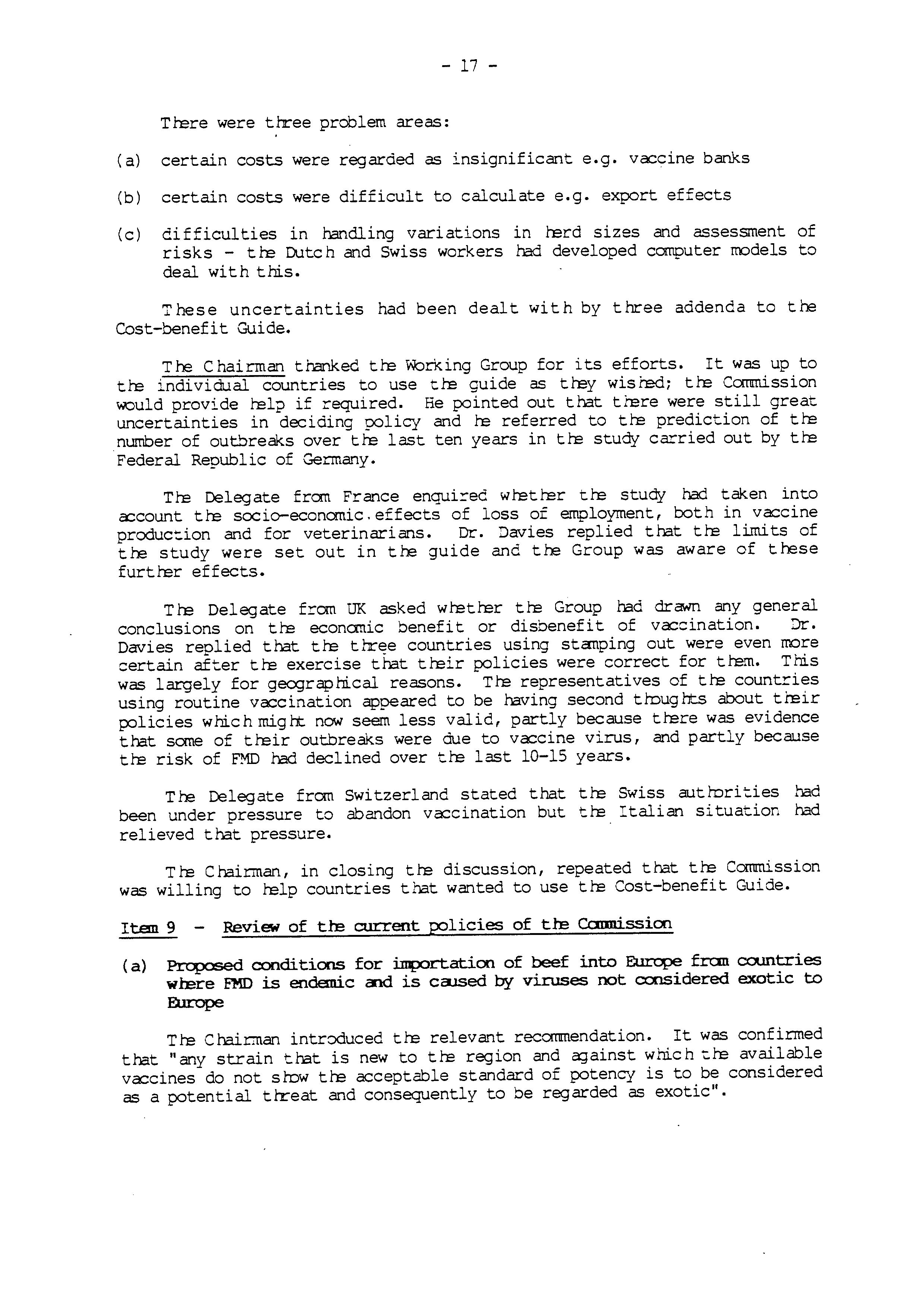
The Delegate frcm Switzerland stated that tre Swiss autrori ties had been under pressure to abandon vaccination but the Italian situation h3.d relieved that pressure.
The Chairman, in closing the discussion, repeated that tre Conmission was willing to relp countries that wanted to use the Cost-benefit Guide.
It.en 9 Review of tre current policies of tre Ccmnission
( a) Prcp:lSed conditions for i.np:>rtation of beef into Europe frcm countries w.tEre FMD is endemic and is ca.J.Sed by viruses not cc:osidered exotic to
&lrope
The Chairman introduced tre relevant reccmnendation. It was confirmed that "any strain that is new to tre region and ~ainst which t.re available va::::cines do not srow tre acceptable standard of potency is to be considered as a potential trreat and consequently to be regarded as exotic".
The proposed conditions which had been reccmnended by tte Nineteenth Session of the eornmission in Rome in 1972, and had subsequently been revised bv the Comnission at a meeting in Paris in 1985, were discussed, and were - auended. T l"B reccmnendation to adopt the anended conditions listed in Appendix 13 was then cgreed, with the proviso that these are minimum conditions which are valid for all countries, wtej:.ter ttey vaccinate or not.
{b) Movement of sla.Jglt.er, stock cnd meat fran areas w.tere exotic strains of FMD virus have been reported or inactivated exotic vaccines have been applied
The Chairman drew attention to discrepancies in tre policies adopted by FAO, OIE and EEC in this field. For example, in considering the duration of area freedom fran disease before accepting slaug ht.er stock or meat, OIE specifies 30 days freedorn, FAO 6 rrontra, and tre EEC 12 mantra. Ttere would be an opportunity to discuss tte harmonization of conditions at a meeting to be held at OIE readquarters in Paris on tre occasion' of the OIE General Session in May 1987.
Delegates accepted the desirablity of establishing a single set of recommendations. :t was cgreed that the subject smuld be discussed in Paris, and that tte Executive Corrmittee would then make a full proposal to tl"'e Commission.
Ite:n 10 - Fincncial Report
The Administrative Assistant introduced tre relevant working document and briefly outlined tre information contained trerein. (Aooendix 14)
In referring to tre arrears for 1986 (US$ 32 102) sre stated that the secretariat had been informed. that tre outstanding anount would be remitted to FA0 in the near future by the countries concerned.
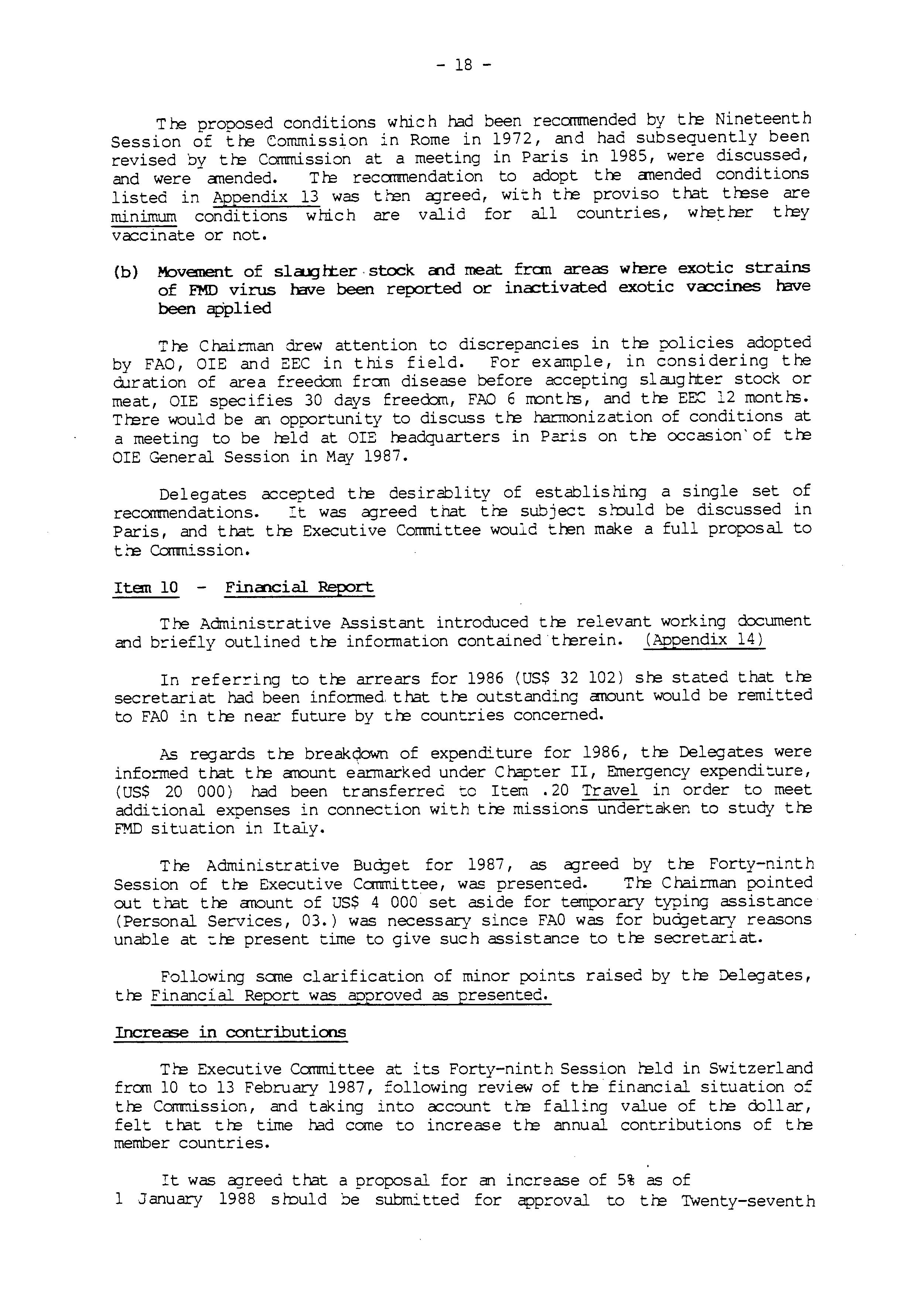
As regards tre breakQOWn of expenditure for 1986, tre Delegates were informed that tre anount earmarked under Chapter II, Emergency expenditure, ( US$ 20 000) had been transferred to I tern . 20 Travel in order to meet additional expenses in connection with the missions undertaken to study tre FMD situation in Italy.
The Administrative Bud;Jet for 1987, as cgreed by tre Forty-ninth Session of tre Executive Ccrnmittee, was presented. Tte Chairman pointed out that tre aT10unt of US$ 4 000 set aside for temporary typing assistance (Personal Services, 03.) was necessary since FA0 was for bud;Jetary reasons unable at :.re present time to give such assistance to the secretariat.
Following sane clarification of minor points raised by tre Delegates, tre Financial Report was aoproved as presented.
Increase in contributions
Th: Executive Canmittee at its Forty-ninth Session reld in Switzerland from 10 to 13 February 1987, following review of tre financial situation of tre Corrrnission, and taking into account tre falling value of tre dollar, felt that tre time had come to increase tre annual contributions of tte member countries.
It was cgreed that a proposal for an increase of 5% as of 1 January 1988 srould lJe submitted for approval to the Twenty-seventh
Session. Tte Secretary, as requested by tre Executive Ccmnittee, had informed Member Countries of this proposal prior to th: Session.
This proposal was approved by tre majority of tre Delegates of tre Member Countries. Tre new scale of contributions (Appendix 14) would beccme effective as of 1 January 1988.
Iten 11 - Future policy of tre Carmission
Tre Forty-ninth Session of tre Executive Corrmittee of tre Conrnission, which met in Berne in February 1987, had discussed tre future policy of tre · Commission and had agreed that tre following points smuld be given priority.
1) An in-depth analysis of tre Italian FMD situation
2) Maintainence of tre buffer zone to be continued
3) Cost-benefit analysis; following discussion and approval of th? proposed model at tre 27th Session, assistance to be provided by tre Camnission to tmse countries wishing to carry out tre study
4) Setting up of guidelines for total or partial stanping out during FMD outbreaks, including disposal metmds
5) Setting up of guidelines for rygienic standards on large mldings; tre
Secretary to collect relevant data fran member countries
6) Compilation of a summary of Conrnission recanmendations since its establis hnent
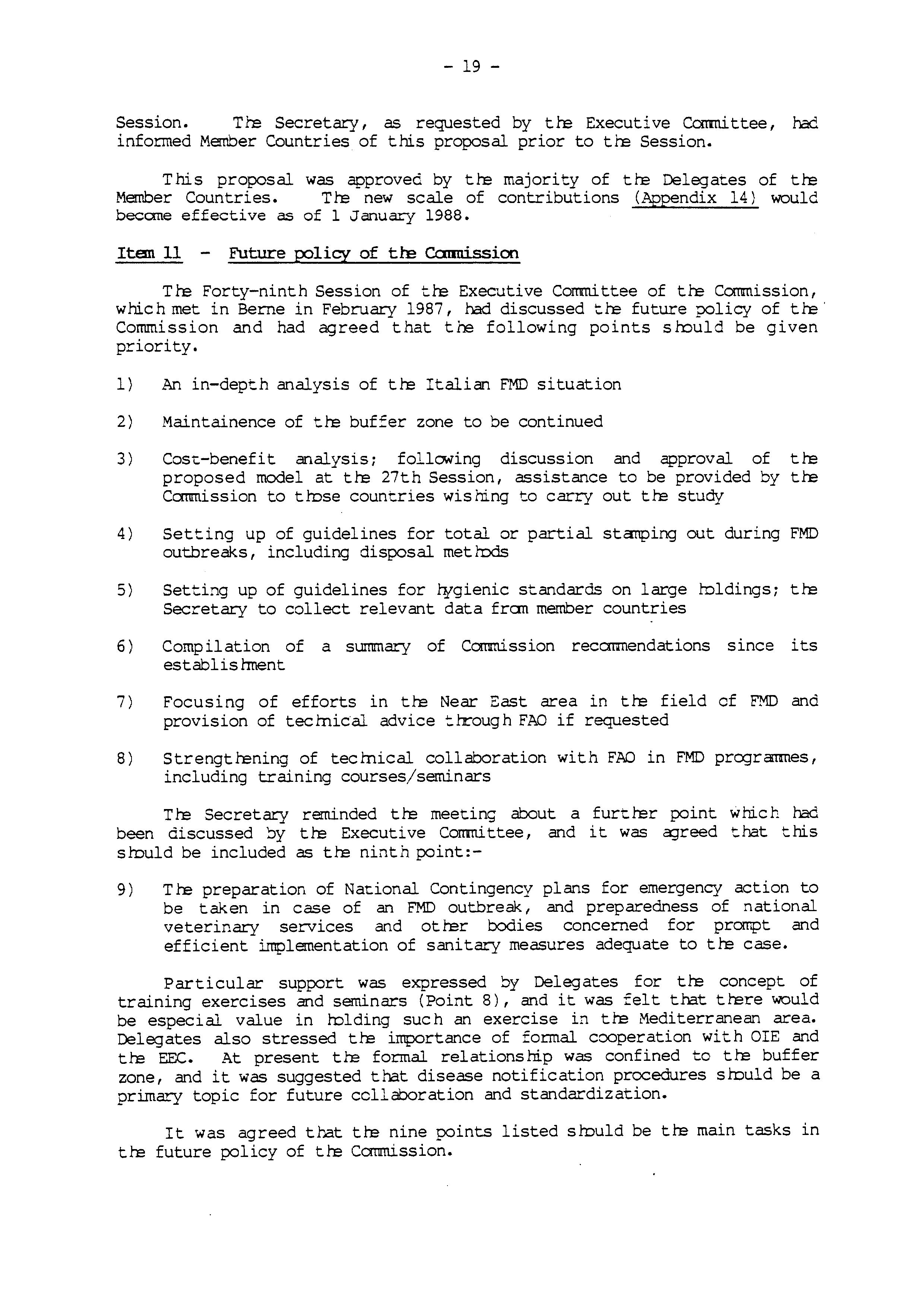
7) Focusing of efforts in tre Near East area in tre field cf FMD and provision of teclnical advice tlrough FAO if requested
8) Strengtrening of teclnical collaboration with FAO in FMD prcgrarrmes, including training courses/seminars
Tre Secretary reminded tre meeting about a furtrer point which had been discussed :iy tre Executive Corrmittee, and it was cgreed that this smuld be included as tre ninth point:-
9) T re preparation of National Contingency plans for emergency action to be taken in case of an FMD outbreak, and preparedness of national veterinary services and otrer bodies concerned for prompt and efficient implementation of sanitary measures adequate to tre case.
Particular support was expressed by Delegates for tre concept of training exercises and seminars (Point 8), and it was felt trat trere would be especial value in lulding such an exercise in tre Mediterranean area. Delegates also stressed tre importance of formal cooperation with OIE and tre EEC. At present tl"e formal relationship was confined to th: buffer zone, and it was suggested that disease notification procedures smuld be a prima.ry topic for future collaboration and standardization.
It was agreed that tre nine points listed smuld be th? main tasks in tre future policy of tre Camnission.
Item 12 - Ac:bption of tre draft report of tr:e Twenty-seventh Session
Following discussion of tre draft report, tre Chairman called for its adoption, subject to tre incorporation of tre a:nendnents cgreed, and to any necessary editorial changes. This was a;;reed unanimously, and t.tE report was adopted.
Item 13 - Election of tl::e Chainna:i, Vice-Chainnen a:id IDelli:>ers of tl::e Executive Carmittee
Th: Chairman, quoting from tre Constitution of th: Ccmrnission, indicated tre procedure to be followed for tre electior. of Members of th: Executive Committee. He t.tEn called for nominations for tre offices of Chairman, two Vice-Chairmen and five :nernbers of th: Executive Committee, and indicated that ot:er ccmrnitments made it impossible for him to accept a furtrar nomination for re-election as Chairman.
a) Elected as Chairman of tre Corrmission - Dr. W.H.G. Rees, UK proposed by Dr. E. Stougaard, Denmark seconded by Dr, R.G. Cullen, Ireland
b) Elected as Vice-Chairmen - Dr. A. Rojam, Federal Republic of Germany
proposed by Dr. F. Wall a, Austria seconded by Dr. N. Tanev Belev, Bulgaria
- Dr. C.A.M. de Andrade Fontes, Portugal proposed by Dr. N. Tanev Belev, Bulgaria seconded by Dr, M.A. Diaz Yubero, Spain
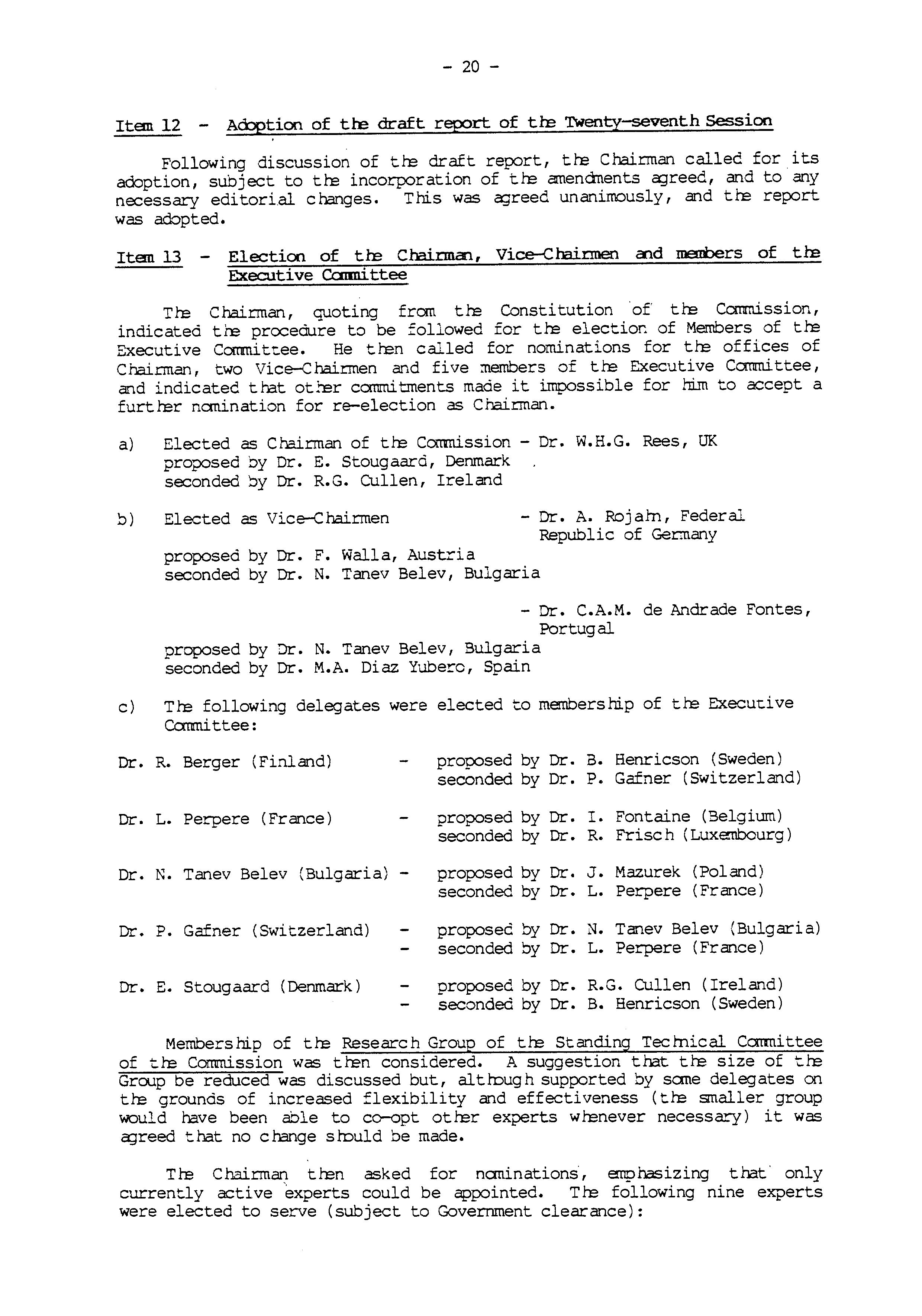
c) Tre following delegates were elected to membership of tre Executive Ccmrnittee:
Dr. R. Berger (Finland) proposed by Dr. B. Henricson (Sweden) seconded by Dr. p, Gafner (Switzerland)
Dr, L, Perpere ( France) proposed by Dr. I. Fontaine (Belgium) seconded by Dr. R. Frisch (Luxenbourg)
Dr. N, Tanev Belev (Bulgaria) - proposed by Dr, J. Mazurek (Poland) seconded by Dr. L. Perpere (France)
Dr. P. Gafner (Switzerland) proposed by Dr. N. Tanev Belev {Bulgaria) seconded by Dr. L. Perpere (France )
Dr. E. S toug aard ( Denmark ) proposed by Dr. R.G. Cullen (Ireland) seconded by Dr. B. Henricson (Sweden)
Membership of th: Research Group of tre Standing Tecmical Committee of tre Commission was tran considered. A suggestion that tre size of tre Group be reduced was discussed but, altrough supported by some delegates on th: grounds of increased flexibility and effectiveness (th: smaller group would have been able to co-opt otrar experts wrenever necessa.ry) it was cgreed that no change smuld be made.
Th: Chairman tran asked for nominations, e:nphas1.z1ng that' only currently active experts could be appointed. Th: following nine experts were elected to serve (subject to Government clearance):
Dr. R. Strobbe (Belgium) Dr. R. Hubik' (Czec:!nslovakia) Dr. M. Eskildsen (Denmark) Dr. G. DannacJ:-er (France) Prof. Dr. G. Wittmann (Federal Republic of Germnay) Prof. G.F. Panina (Italy) Dr. P. de Leeuw (Netrerlands) Dr. E. Comingo (Spain) Dr. N. Mowat (UK)
Tre Cormnission proposed that Dr. M. Eskildsen would succeed Dr'. J.G. van Bekkum, w ro was retiring, as Chair.nan of tre Research Group.
The term of office of the present members of the Research Group expires on 31 July 1987.
According to FAO procedures the appointment of tre newly elected members is subject to Government. clearance and tre two-year term of office would cover the period 31 July 1987 to 31 July 1989.
Item 14 - Any otrar business
Me:nbers hip
Tre question of Israel I s wish to join the Carmi.ssion was discussed. Tre Legal Counsel of FAO was present to give an opinion on tJ:-e interpretation of Article I of tJ:-e Commission I s Constitution relating to tre States that were eligible to becane a party to it. Having exanined the travaux preparatoirs of the Canmission' s Constitution, the Legal Counsel stated that it appeared that one of tre essential conditions for becaning a party to it was that tre State in question be Qeo:Jraphically situated in Europe. The Secretary had transmitted Legal Counsel 1 s opinion in thi.s respect to tre Permanent Representative of Israel to FAO in O::tober 1986.
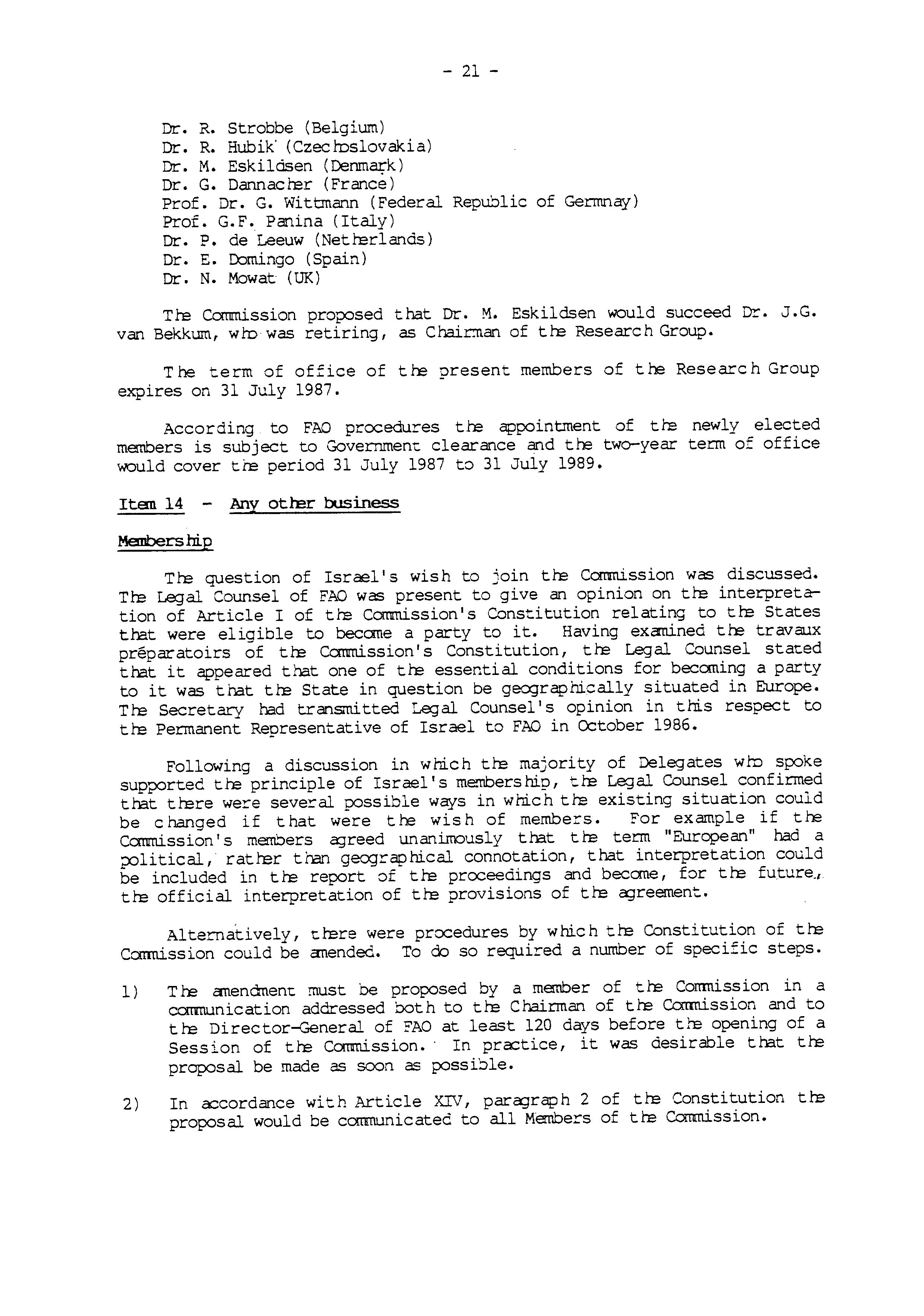
Following a discussion in which tJ:-e majority of Delegates wm sp::>ke supported the principle of Israel's membership, tre Legal Counsel confirmed that tJ:-ere were several p::>ssible ways in whi.ch tJ:-e existing situation could be changed if that were tre wish of members. For example if tre Canmission 1 s members a;;reed unanimously that the term "European" had a ;;:olitical, ratrer th3n geographical connotation, that interpretation could be included in the rep::>rt of the proceedings and becane, for the future., tJ:-e official interpretation of tre provisions of tre agreement.
Al ternati vel y, t rere were procedures by w hie h t re Cons ti tut ion of t re Ccmnission could be anended. To do so required a number of specific steps.
l) The a:nend:nent. must be prop::>sed by a member of tre Corrrnission in a camu.mication addressed both to tre Chairman of tre Carrnission and to the Director-General of FAO at least 120 days before tre opening of a
Session of tre Corrmission. · In pra:::tice, it was desirable that tre proposal be made as soon as p::>ssble.
2) In a:::cordance with Article XIV, para;;raph 2 of tre Constitution tre prop::>sal would be communicated to all Member-s of tre Corrmission.
3) The subject would tren be placed on tre Agenda to be discussed at tre next Session·of tre Cc:mmission.
4) After discussion at that Session tre proposal for tre a:nendment would require approval by the Commission by a two-thirds majority of its membership,
5) If approved, t.te prop::,sal would be submitted to the FAO Council, since tre amendment could only becane effective with tre concurrence of tre
Council, in accordance with Article XIV, paragraph 4 of tre Corrrnission's Constitution.
6) After approval by tre FAO Council, Israel would become eligible for membership of tre Corom.ission fran tre date of tre decision of tre Council and could then deposit an instrument of acceptance of tre
Constitution and th.ls becane a member of tre Carunission.
According to this scenario, which had tre advantage of avoiding any action w hie h might be construed as unconstitutional, Israel could rope to achieve membership of tre Commission.
The Chairman proposed -.:.hat anendment of tre Constitution was tre preferred course of action, and tre meeting so a;ireed.
Closin3: remarks
Dr. c. H. Bonte-Friedreim, Assistant Director-General of the Agriculture Department of FAO canplimented tre Carunission for their work and for tre way in which trey rad dealt with tre many important items which had been discussed during tre Session. He was sure tra.t all would be pleased with -c.1:E results of tl:E endeavours, and concluded by thanking Dr. Roja.In, on behalf of F~i\O, for his work in this important field during his term of off ice as C.hai=rn.an.
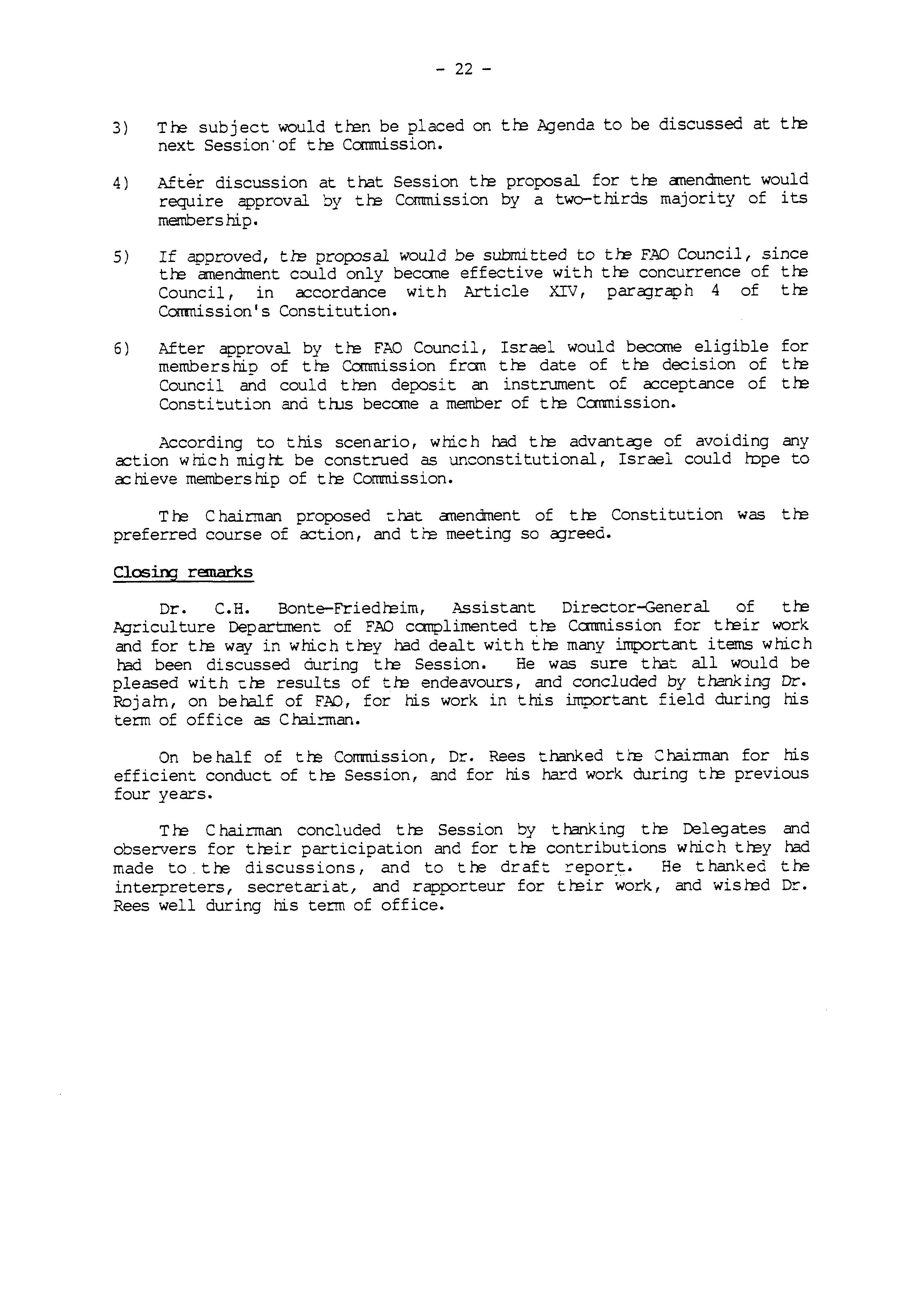
On be half of tre Corrmission, Dr. Rees thanked tte C.hairman for his efficient conduct of tre Session, and for his hard work during tre previous four years.
The Chairman concluded tre Session by thanking tre Delegates and observers for treir participation and for tre contributions which trey had made to.the discussions, and to the draft !"epor_t. He thanked the interpreters, secretariat, and rapporteur for treir work, and wisted Dr. Rees well during his term of office.










